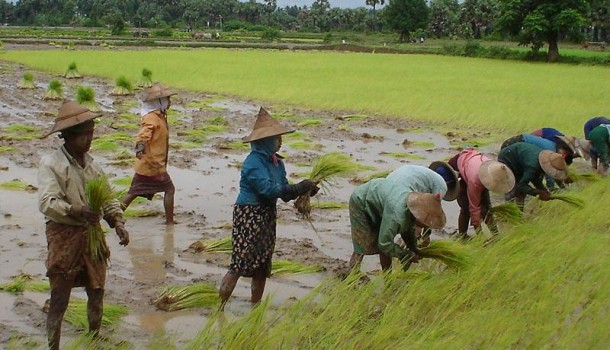Two new international reports warning of the economic consequences of climate change for Southeast Asia have emerged just as Burma, backed by European Union funds, begins a program to mitigate impacts.
One of the reports suggests that Burma—already labelled a country in “extreme risk” if temperatures rise as predicted—will be wedged between neighbors whose capital cities face serious disruption in the future.
The Thai capital Bangkok, which has close and growing business links with Rangoon, and the Bangladeshi capital Dhaka are rated in top five most at risk cities in the world due to the effects of climate change.
That is according to the Climate Change and Environmental Risk Atlas published by business risk analysis company Maplecroft of the UK, which doesn’t refer specifically to Burma’s commercial capital Rangoon but ranks the country as a whole at 16th among the world’s most at risk economies.
It comes as documents leaked from a new United Nations study on the likely effects of global warming warn of threats to the world’s food supply.
“A United Nations panel of scientists says that globally, rising temperatures will make it harder for crops to thrive. Climate change will pose sharp risks to the world’s food supply in coming decades, potentially undermining crop production and driving up prices at a time when the demand for food is expected to soar,” said the New York Times, quoting from a leaked United Nations document.
The warnings are in a report being prepared by a United Nations panel, the Intergovernmental Panel on Climate Change. The report is not final and could change before it is officially released in March, the Times said.
“In a departure from an earlier assessment, the scientists concluded that rising temperatures will have some beneficial effects on crops in some places, but that globally they will make it harder for crops to thrive—perhaps reducing production over all by as much as 2% each decade for the rest of this century, compared with what it would be without climate change” the newspaper quoted.
This is potentially bad news for Burma as it tries to expand its rice production to become a leading exporter as it was in the past before independence.
The UN is partnering the EU in financing a US$5.4 million research program in Burma to help prepare the country for climate change, but the Maplecroft study is a timely warning that the Southeast Asian nation’s new opening up exposes it to even more risks to its economic development, say some analysts.
“Myanmar’s growing commercial interconnectivity with the region, especially with Thailand where a lot of investment is originating from, will inevitably expose it to more climate change problems,” an economist with a Western embassy Bangkok told The Irrawaddy.
“We saw what economic chaos can result from the huge weather-inflicted floods that swept down into Bangkok in 2011,” said the economist, who spoke on condition of anonymity.
The other cities in Maplecroft’s top five most at risk are all in Asia: Mumbai, Manila and Kolkata.
Maplecroft said its risk rankings are based on three factors: “Exposure to extreme climate-related events, including sea level rise and future changes in temperature, precipitation and specific humidity; the sensitivity of populations, in terms of health, education, agricultural dependence and available infrastructure; and the adaptive capacity of countries to combat the impacts of climate change, which encompasses, R&D, economic factors, resource security and the effectiveness of government.”
However, Maplecroft sees some positives for countries such as Burma with extreme-risk status.
“The ability of highly vulnerable countries to manage the direct impact of extreme events on infrastructure will be a significant factor in mitigating the economic impacts of climate change and may present opportunities for investment,” it said. “Adaptive measures, such as building flood defences and greater infrastructure resiliency, will, however, require the sustained commitment of governments.”
Several Burmese government ministries are now working in partnership with the EU and UN in the Myanmar Climate Change Alliance which will use the US$5.4 million of mostly European grant money to investigate problems and solutions. They include the Ministry of Environmental Conservation and Forestry, the Department of Meteorology and Hydrology of the Ministry of Transport, and the Ministry of National Planning and Economic Development.
The program will be financed until 2018 by the EU and UN.
“The potential impacts of climate change and the current low state of preparedness necessitate an overarching response. Myanmar is engaged in an active process of reform which presents great opportunities as well as challenges in terms of moving to a climate-resilient, low-emission development path,” said the Global Climate Change Alliance, established by the EU in 2007.
“The new [Burmese] government is starting from quite a low base in responding to climate change with respect to awareness, technical capacity and an appropriate institutional framework. It recognises the need for a national climate change strategy defining the overarching framework for mainstream climate change into development planning,” said the alliance.

















